Trailblazers—One Size Does Not Fit All: Inclusive Design & the Modern Consumer
On June 14, Coresight Research and Alvanon cohosted Trailblazers—One Size Does Not Fit All: Inclusive Design & the Modern Consumer in New York City. Trailblazers is an annual Alvanon event that focuses on trends that are shaping and impacting the apparel and fashion industry. Founded in 2001, Alvanon is a global apparel and product development consultancy that uses a data-driven approach to solve the challenges of sizing and fit inherent in the apparel industry. More than 300 C-suite retail executives, entrepreneurs, designers, creators and other business leaders attended this year’s invitation-only event.
Speakers and panelists focused on how inclusive and adaptive design is revolutionizing the way we think of fashion consumers. Presentation and discussion topics included designing for plus-size consumers, various communities’ specific apparel needs, the challenges of inclusive design, new visions of beauty and fashion, and tools that enable digitalization.
Presenters discussed how retailers, designers, manufacturers and startups are working to better meet the clothing needs of people with various disabilities and conditions as well as those who wear plus sizes. The event concluded with the Trailblazers14 startup pitch contest, where 14 emerging innovators showcased their technology solutions for retailers and brands.
The event was cosponsored by Avery Dennison, Goodwill of NY & NJ, MouthMedia Network, MSQ Ventures, Panasonic and Silicon Valley Bank. Below, we share highlights from the event’s sessions, panels and pitch competition.
A Look at the Adaptive Clothing Market
The inclusive clothing and accessories market, which encompasses adaptive designs as well as plus-size and extended-size apparel, is underserved, and retailers have an opportunity to increase top-line sales while positively impacting the lives of millions of consumers whose specific clothing needs have gone unmet in the past. The Trailblazers conference explored this multibillion-dollar retail opportunity.
Niche markets, including adaptive and plus-size designs, are growing fast in a world increasingly invested in empowering the underrepresented. Coresight Research estimates that the global adaptive clothing market will total $278.2 billion this year and grow to $325.8 billion in 2022. We further estimate that the US adaptive clothing market will reach $44.5 billion in 2018 and grow to $51.8 billion by 2022.
Highlights from the Trailblazers Conference
Janice Wang, CEO of Alvanon, kicked off the event by discussing inclusive design and the adaptive clothing market.
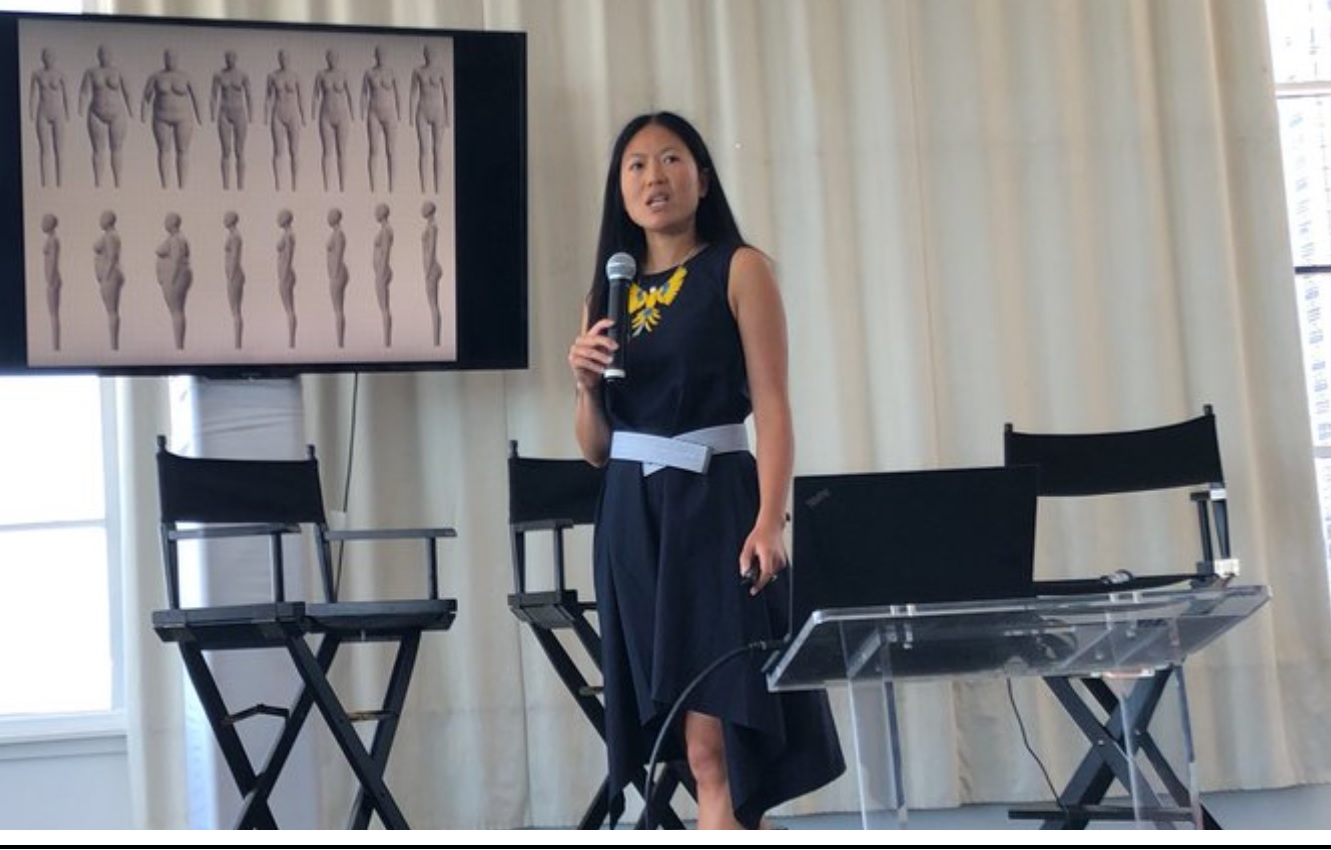 Janice Wang, CEO, Alvanon
Source: Coresight Research
Janice Wang, CEO, Alvanon
Source: Coresight Research
The Industry Is Evolving to Meet Demand for Fashion that Fits All Body Types and Abilities
Coresight Research CEO and Founder Deborah Weinswig discussed the need for adaptive and inclusive fashion, the segment’s recent growth and the $133 billion market opportunity it presents. Adaptive clothing design has historically prioritized function at the expense of fashion, she said, but social media has given voice to shoppers who have specific clothing needs and also want to be able to dress stylishly. Trending Instagram hashtags such as #disabledandcute, #inclusivefashion and #wheelchairgirl evidence a growing consideration for fashion that meets the needs of various communities.
The traditional sizing model captures less of the fashion market than its widespread use might imply, according to Weinswig. She noted that 25% of US shoppers have browsed in plus sizes and that 30% have shopped petite sizes. Retail offerings in these size categories are typically limited and partitioned off in stores, but customers want to shop with their friends of all sizes, Weinswig said. Online sales at department stores present an area of opportunity, and Zappos and Target have been at the forefront of this growing trend, offering adaptive footwear and apparel ranges to their customers. Designer Slick Chicks has created easy-to-fasten women’s underwear that fits all body types and online retailer Fashion Nova offers a broader range of sizes with just one click instead of a separate plus-size section. Growing consideration of consumers’ experiences with fashion will reshape the market to better suit shoppers, Weinswig said.
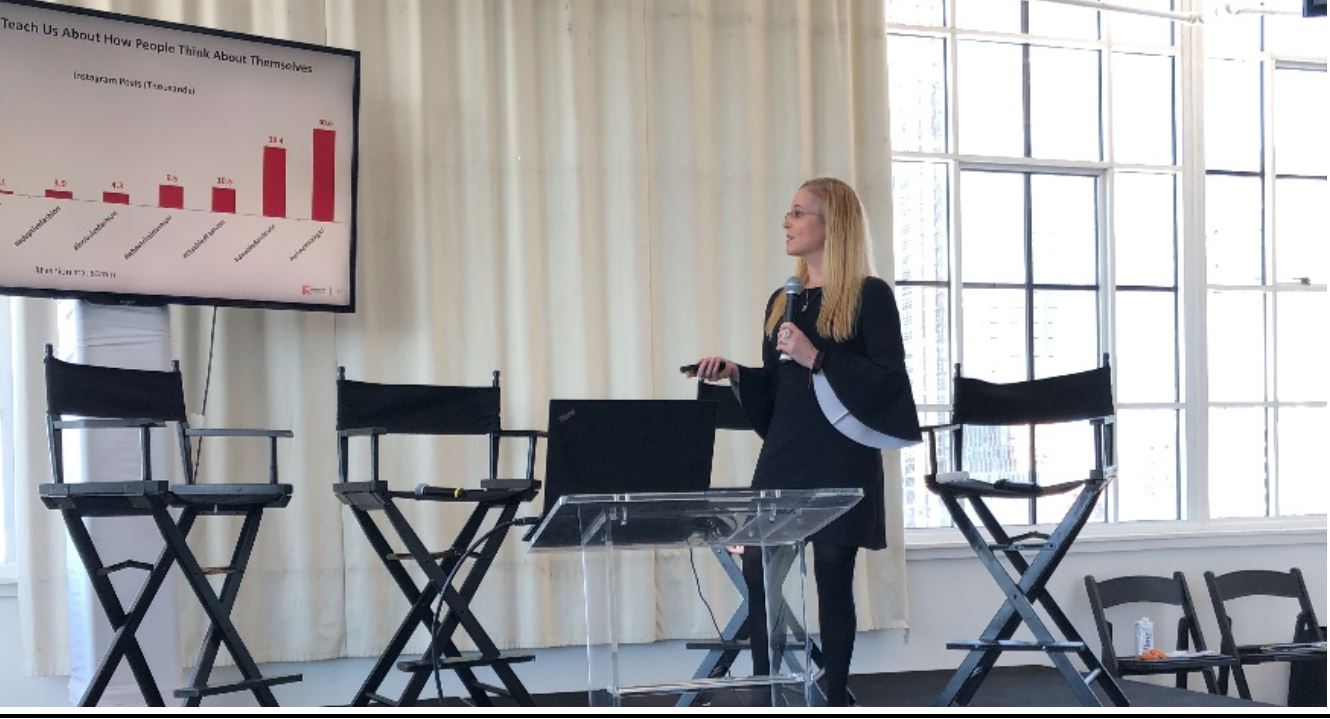 Deborah Weinswig, CEO and Founder, Coresight Research
Source: Coresight Research
Deborah Weinswig, CEO and Founder, Coresight Research
Source: Coresight Research
Fashion Executives Discuss Designing for People with Special Needs and the Need for Improved Fashion Options
Jessica Kahan Dvorett of Gwynnie Bee, Becca McCharen-Tran of Chromat and Polina Veksler of Universal Standard participated in a panel discussion on designing clothes for people with specific needs. The group focused on the need for improved fashion options and industry attitudes toward people who do not conform to traditional fashion norms. According to Dvorett, less than 20% of women wear clothing that is under size 10 and most wear a size 16–18. The entire panel stressed the importance of shifting the fashion industry’s focus away from small, single-digit sizes in women’s apparel and toward the midrange sizes that most American women actually wear.
The Fashion Industry Must Continue to Adapt in Order to Thrive in the Digital Age
Catherine Cole, Executive Director at data and advisory platform Motif, said that the fashion industry is not where it should be in terms of workforce skills. She said this challenge affects the industry’s ability to adapt to technological advancements and meet the specific fashion needs of diverse communities. Cole cited potentially troubling statistics: she said that 62% of companies experience hiring difficulties due to a lack of appropriately skilled workers and that over 50% of managers in the fashion industry are concerned about a lack of training. Cole’s main point was that the fashion industry is in danger of falling behind in terms of adapting to and thriving in the digital age.
Celebrating a New Vision of Beauty and Fashion: A Q&A with Industry Experts
Grace Jun, Executive Director of Open Style Lab, Xian Horn of Give Beauty Wings and Camila Chiriboga of LIO Innovation Lab began their session by taking the audience through their individual journeys toward designing and creating beautiful and functional apparel. The panelists emphasized the intensely personal nature of designing customized clothing for people with unique needs and said that they collaborate closely with individuals in order to understand their exact needs and to be able to meet the needs of a diverse array of shoppers.
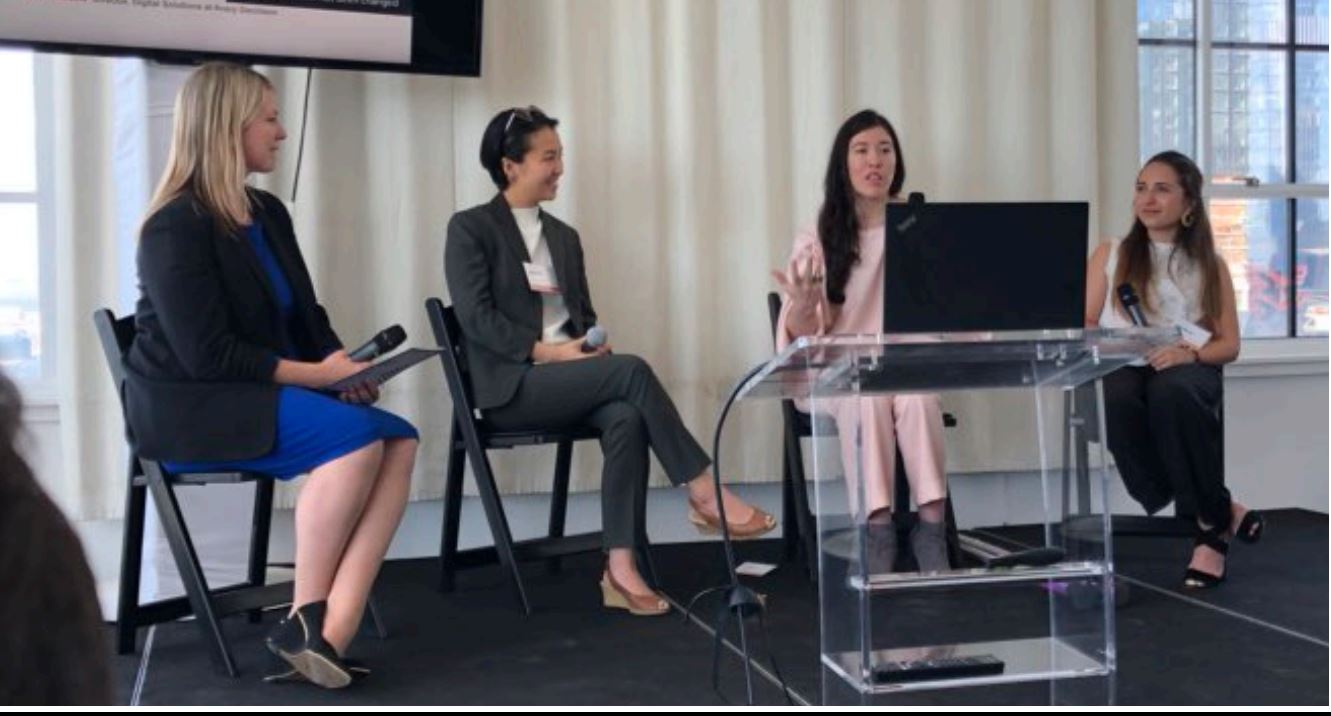 From left to right: Julie Vargas, Director, Digital Solutions, Avery Dennison; Grace Jun, Executive Director, Open Style Lab; Xian Horn, Executive Director and Founder, Give Beauty Wings; and Camila Chiriboga, Creative Strategy and Inclusive Design, LIO Innovation Lab, Global Brands Group
Source: Coresight Research
From left to right: Julie Vargas, Director, Digital Solutions, Avery Dennison; Grace Jun, Executive Director, Open Style Lab; Xian Horn, Executive Director and Founder, Give Beauty Wings; and Camila Chiriboga, Creative Strategy and Inclusive Design, LIO Innovation Lab, Global Brands Group
Source: Coresight Research
Demand for Adaptive Fashion Continues to Grow as the Retail Market for It Matures
Rick Darling, Executive Director of LF Americas, moderated a discussion on fashion that accommodates disability and its role in the larger apparel market. Panelist Maura Horton founded MagnaReady, an adaptive apparel brand, after creating a shirt with magnetic closures for her husband. Horton said that her husband had been diagnosed with Parkinson’s disease and struggled with the buttons on his shirts. He didn’t like the adaptive clothing options on the market because he thought they would make him stand out, so she designed a shirt that looked like any other button-down but had hidden magnets instead of regular button closures, enabling him to dress himself independently.
Shelly Fogel, EVP of LF Americas, reviewed the scope of the adaptive clothing market, noting that more than a billion people worldwide are affected by some type of disability, including 2.9 million wounded US veterans. Additionally, an aging population is raising demand for stress-free clothing options, Fogel said.
Alexandra Connell, Creative Energy Officer at Patti + Ricky, an online department store for people with disabilities, talked about the inspiration behind her business. She said that when her mother had brain cancer, she wanted Connell to find her a fashionable cane. After much searching, Connell was able to find one, but she identified a need for a marketplace where people with various disabilities could find stylish and functional adaptive apparel and accessories. Connell said she created Patti + Ricky to fill that need.
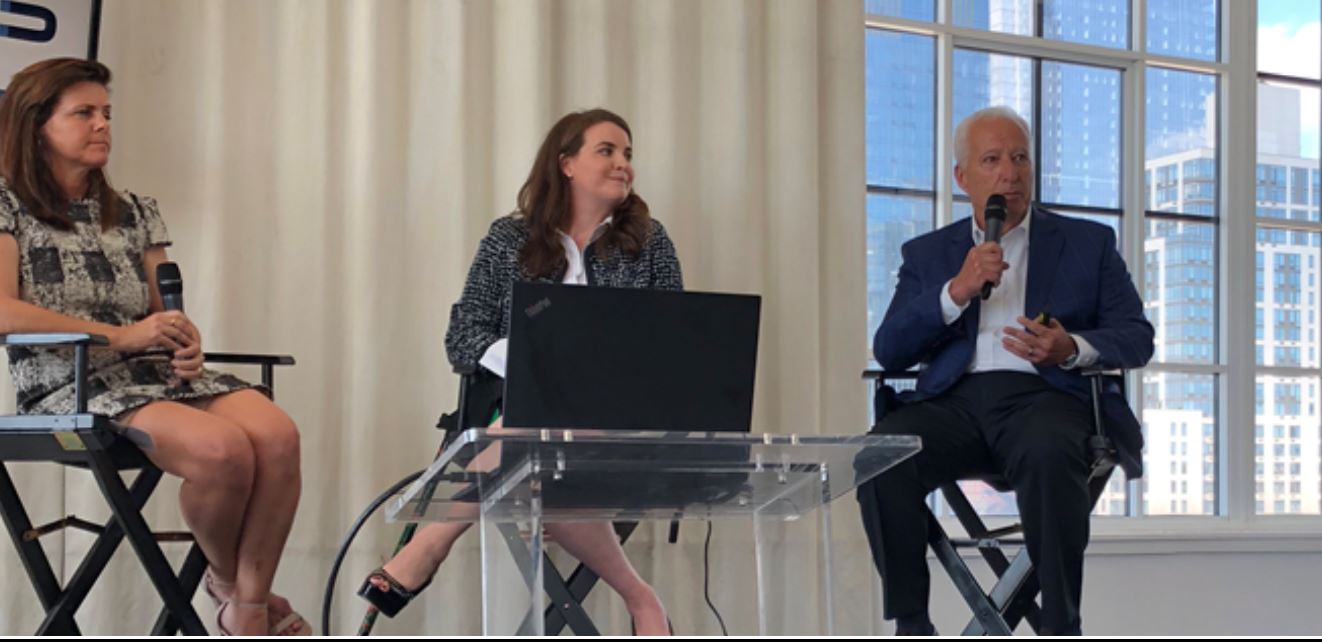 Maura Horton, Founder & CEO, MagnaReady; Alexandra Connell, Creative Energy Officer, Patti + Ricky; Shelly Fogel, EVP, LF Americas
Source: Coresight Research
Maura Horton, Founder & CEO, MagnaReady; Alexandra Connell, Creative Energy Officer, Patti + Ricky; Shelly Fogel, EVP, LF Americas
Source: Coresight Research
Former Dean of the School of Fashion at Parsons Shares Insights and Creative Approaches to Design
Simon Collins, Founder of WeDesign.org and former Dean of the School of Fashion at Parsons School of Design, offered a series of suggestions for steering design:
- Act brilliantly only, because anyone else can outdo a half-hearted effort.
- Tell a story in what you create, because others will read into it and form one in its absence.
- Think globally to stay on top. Complacency is tempting, but retailers today must be global-minded always, regardless of where they are.
- Be quick to evolve and recognize needs, and make progressive changes.
- What matters is what people hear, not what they say, so listen always.
- Design to create value, not profit. Valueless creations will be short-lived.
- Do good, because consumers find out who doesn’t. Anyone wearing clothes is part of the fashion industry, and they can decide not to support those who aren’t doing good.
- Most importantly, do it, because ideas without action are worthless.
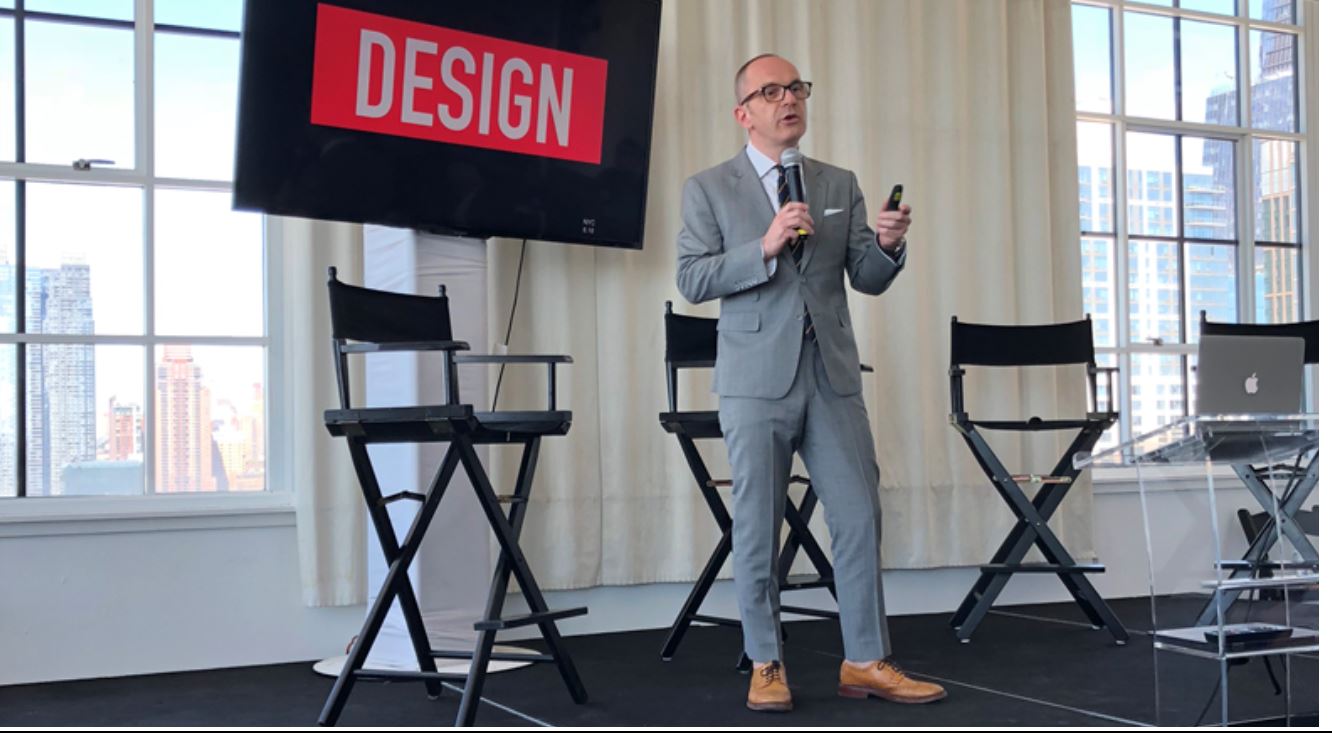 Simon Collins, Founder, WeDesign.org
Source: Coresight Research
Simon Collins, Founder, WeDesign.org
Source: Coresight Research
Expert Panel: Designing for Functional Work
Chaitenya Razdan of Care+Wear, Lucy Jones of Ffora, Alexandra Connell of Patti + Ricky and designer and creative director Ginny Hilfiger participated in a panel discussion on the need for a more fashion-focused approach to functional clothing for workers and differently abled people. Razdan said that fashion should allow “every person to feel like a person.” The panelists presented some of their innovative, functional and fashionable adaptive clothing items, which ranged from shirts with magnet closures instead of buttons to hospital wear for cancer patients. The panelists agreed that the fashion industry needs to adjust to ensure that it caters to all people, including those who are differently abled and differently sized.
Trailblazers14 Startup Pitch Competition
The conference concluded with the Trailblazers14 startup pitch competition, which featured 14 companies that are providing innovative solutions across the retail value chain. Deborah Weinswig emceed the competition, and the startups’ pitches were evaluated by four judges: Meredith Darnall, SVP, Business Intelligence & Strategy, GGP; Marc Estigarribia, Head of Cross-Border Origination and Engagement, M&A, MSQ Ventures; Tami Fersko, EVP, Finance, The Jones Group; and Katy Gaul-Stigge, CEO and President, Goodwill of NYNJ.
Three of the presenting startups—Markable, Radius8 and Ziel—tied for winner of the competition, and each of the three received a prize consisting of a 45-minute podcast interview with MouthMedia and a one-week pop-up shop at Goodwill of New York. Markable also received a three-week consulting engagement with MSQ Ventures.
Below, we highlight the startups that presented in the Trailblazers14 pitch competition.
Boldfish, Jason Kingdon, Founder and CEO
Boldfish is a free social media detox app that acts as a buffer between the user and his or her digital addiction.
Engagement Agents, Sean Snyder, Founder and President
Engagement Agents helps retailers promptly reclaim lost impressions, traffic and sales for their stores, e-commerce and social channels through the marketing channels of the shopping centers in which they are located.
Fashwire, Hooman Hamzeh, CTO Advisor
Fashwire is a digital platform providing an interactive link between fashion designers and consumers, powering actionable insights with data.
Markable, Balaji Ravindran, COO
Markable is using AI to make all visual content shoppable in order to monetize visual fashion and improve engagement.
Motif, Cathy Cole, Executive Director
Motif is an apparel knowledge hub that connects professionals around the world with the skills and industry experience they need to transform their businesses, lives and careers.
Perfitly, Christina Zimmerman, Business Development Director
Perfitly uses AR/VR to mimic the physical fitting room experience for online apparel shoppers, increasing conversion and reducing returns.
Radius8, Brendan Phelan, Cofounder and VP, Strategy
Radius8 empowers retailers to dynamically merchandise online using the context of their physical stores and local market intelligence to drive online conversion and store foot traffic.
RevCascade, Josh Wexler, CEO and Cofounder
RevCascade has developed technology that enables any retailer, marketplace or publisher to rapidly launch, operate and scale dropship e-commerce programs to transform their business.
Shokay, Carol Chyau, Cofounder and CEO
Shokay is the world’s first socially responsible premium yak down brand. The company sustainably sources hand-combed yak down from the remote Himalaya highlands to bring consumers incredibly light and beautiful textiles.
Spring Marketplace, Ed D’Onofrio, VP, Business Development
Spring Marketplace leverages real-time purchase data to make CRM and marketing activities more robust across online and in-store commerce, delivering incremental revenue.
StyleScript, Jonna Fassbender, Founder and CEO
StyleScript enables every e-commerce platform to deliver personal style advice by harnessing big data, business intelligence and predictive analyses.
Sundar, Jag Gill, Founder and CEO
Sundar is building the world’s largest discovery and sourcing platform connecting fashion brands with manufacturers and suppliers of textiles, trims, components and specialist services.
Swatchbook, Yazan Malkosh, Founder and CEO
Swatchbook is a cloud platform revolutionizing the exploration, visualization and sharing of materials.
Ziel, Marleen Vogelaar, Founder and CEO
Ziel is a turnkey service offering design, manufacturing and retail integration to healthy lifestyle brands that want to sell custom athletic apparel with no minimum order and delivery in under 10 days.
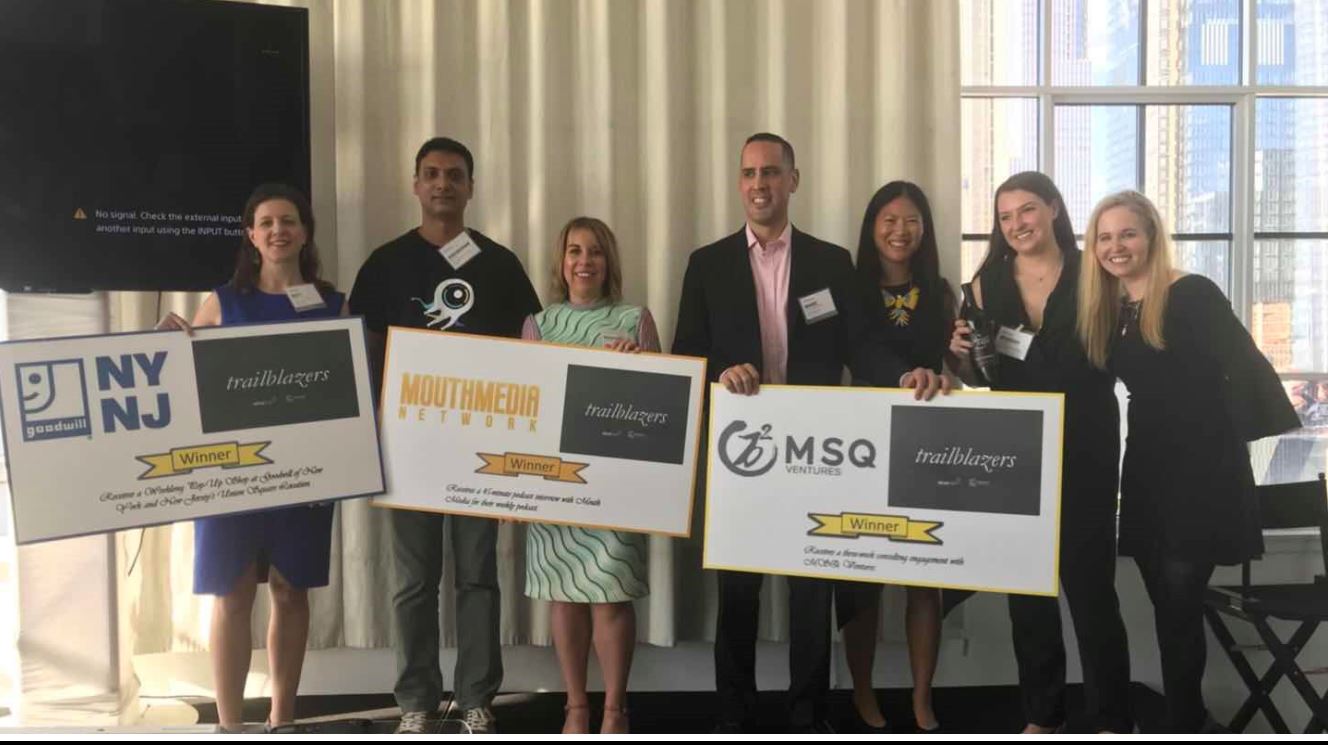 Katy Gaule-Stigge, CEO and President, Goodwill of NYNJ; Balaji Ravindran, COO, Markable; Meredith Darnall, SVP, Business Intelligence & Strategy, GGP; Marc Marc Estigarribia, Managing Director, MSQ Ventures; Janice Wang, CEO, Alvanon; Morgan Halberg, Head of Brand Partnerships, Air Tailor; Deborah Weinswig, CEO, Coresight Research
Source: Coresight Research
Katy Gaule-Stigge, CEO and President, Goodwill of NYNJ; Balaji Ravindran, COO, Markable; Meredith Darnall, SVP, Business Intelligence & Strategy, GGP; Marc Marc Estigarribia, Managing Director, MSQ Ventures; Janice Wang, CEO, Alvanon; Morgan Halberg, Head of Brand Partnerships, Air Tailor; Deborah Weinswig, CEO, Coresight Research
Source: Coresight Research

 Janice Wang, CEO, Alvanon
Source: Coresight Research
Janice Wang, CEO, Alvanon
Source: Coresight Research  Deborah Weinswig, CEO and Founder, Coresight Research
Source: Coresight Research
Deborah Weinswig, CEO and Founder, Coresight Research
Source: Coresight Research From left to right: Julie Vargas, Director, Digital Solutions, Avery Dennison; Grace Jun, Executive Director, Open Style Lab; Xian Horn, Executive Director and Founder, Give Beauty Wings; and Camila Chiriboga, Creative Strategy and Inclusive Design, LIO Innovation Lab, Global Brands Group
Source: Coresight Research
From left to right: Julie Vargas, Director, Digital Solutions, Avery Dennison; Grace Jun, Executive Director, Open Style Lab; Xian Horn, Executive Director and Founder, Give Beauty Wings; and Camila Chiriboga, Creative Strategy and Inclusive Design, LIO Innovation Lab, Global Brands Group
Source: Coresight Research Maura Horton, Founder & CEO, MagnaReady; Alexandra Connell, Creative Energy Officer, Patti + Ricky; Shelly Fogel, EVP, LF Americas
Source: Coresight Research
Maura Horton, Founder & CEO, MagnaReady; Alexandra Connell, Creative Energy Officer, Patti + Ricky; Shelly Fogel, EVP, LF Americas
Source: Coresight Research Simon Collins, Founder, WeDesign.org
Source: Coresight Research
Simon Collins, Founder, WeDesign.org
Source: Coresight Research Katy Gaule-Stigge, CEO and President, Goodwill of NYNJ; Balaji Ravindran, COO, Markable; Meredith Darnall, SVP, Business Intelligence & Strategy, GGP; Marc Marc Estigarribia, Managing Director, MSQ Ventures; Janice Wang, CEO, Alvanon; Morgan Halberg, Head of Brand Partnerships, Air Tailor; Deborah Weinswig, CEO, Coresight Research
Source: Coresight Research
Katy Gaule-Stigge, CEO and President, Goodwill of NYNJ; Balaji Ravindran, COO, Markable; Meredith Darnall, SVP, Business Intelligence & Strategy, GGP; Marc Marc Estigarribia, Managing Director, MSQ Ventures; Janice Wang, CEO, Alvanon; Morgan Halberg, Head of Brand Partnerships, Air Tailor; Deborah Weinswig, CEO, Coresight Research
Source: Coresight Research